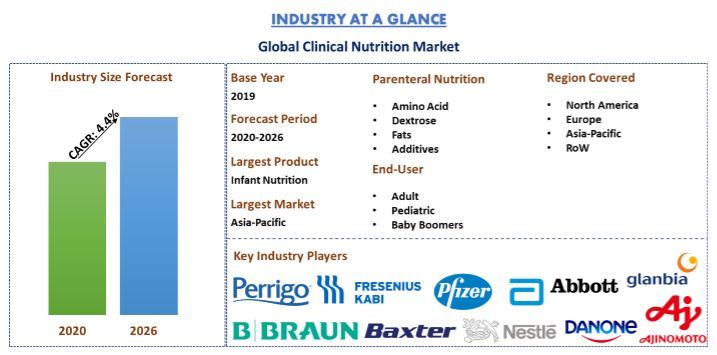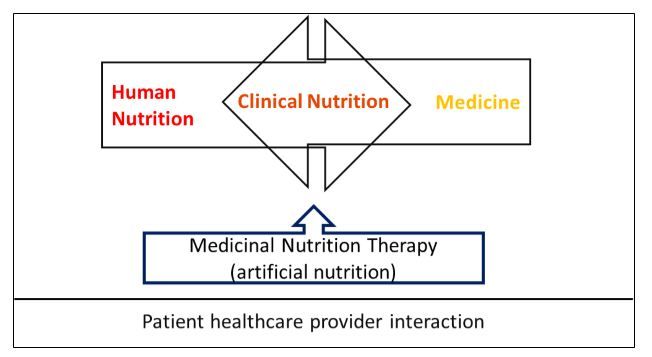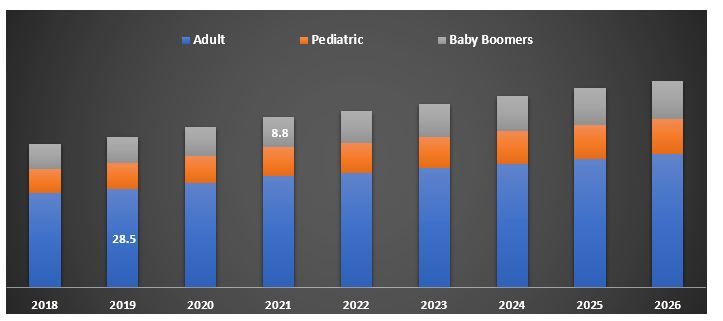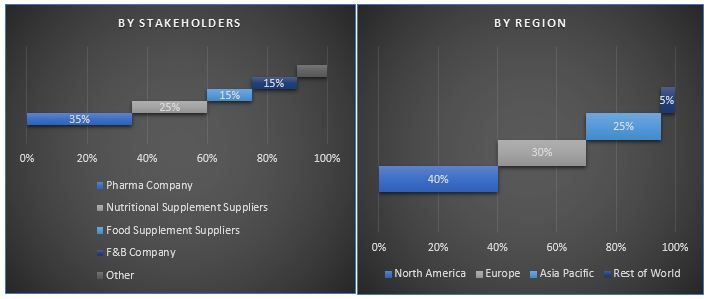- Home
- About Us
- Industry
- Services
- Reading
- Contact Us
Clinical Nutrition Market: Current Scenario and Forecast (2020-2026)
Emphasis on Product (Infant nutrition (Milk-based, Soy-based, Specialized), Enteral nutrition (Standard Fiber Containing, Elemental, Specialized), Parenteral Nutrition (Amino Acid, Dextrose, Fats, Additives)), End-User (Pediatric, Adult, Baby Boomers), Distribution Channel (Convenience Stores, Supermarket/Hypermarket, Drug store, Online Channel) and Region/Country
The global clinical nutrition market was valued at US$ 43.5 billion in 2019 and is anticipated to reach US$ 59.84 billion by 2026 displaying an elevated CAGR of 4.4% over the forecast period (2020-2026). Clinical nutrition refers to the study of nutrients that are necessary for a body to function. Clinical nutrition products assist in improving the overall digestive process including digestion, metabolisms, absorption, transportation, storage, and discharge from the human body. Clinical nutrition is an outcome of the integration of medicine and nutrition. Clinical nutrition is broadly bifurcated into infant, enteral, and parenteral nutrition products. Overall sales of clinical nutrition products are rising with an aging population as well as rising incidence of illnesses and conditions that require clinical nutrition. Growth of population in certain regions and countries is decelerating whereas population aging is accelerating. Globally, there were 703 million older persons aged 65 or over in 2019. Eastern and South-Eastern Asia is home to the largest number of the world’s older population constituting 260 million, followed by Europe and Northern America. Over the next three decades, the global number of older persons is projected to more than double, reaching over 1.5 billion by 2050. Market growth is further attributed to declining fertility rates, improving health standards and increasing health expenditure and rise in the count of children suffering from malnutrition. However, lack of awareness regarding clinical nutrition and stringent government regulations as some of the restricting factors hampering the potential of the global clinical nutrition market.
Clinical Nutrition as the Outcome of the Integration of Medicine and Nutrition
“Amongst product type, Infant Nutrition dominated the market in 2019, generating revenue of US$ 23.07 billion”
Based on product Type, the market is fragmented into infant, enteral nutrition, and parenteral nutrition. Infant Nutrition segment occupied the maximum share in global clinical nutrition market. Adequate nutrition during infancy is essential for lifelong health and wellbeing. Enteral Nutrition segment is expected to witness CAGR growth of 3.8% during the forecast period 2020-2026.
“Amongst Infant nutrition, Milk Based products are projected to be the largest market throughout the forecast period”
Global infant nutrition market is bifurcated into milk-based, soy-based and specialized. In 2019, Milk Based Infant nutrition products dominated the market, with 55.9% share. Milk Based Infant nutrition products are altered to resemble breast milk. The formula is designed in order to make it easier to digest and with right amount of nutrients.
“Standard Fiber Containing Enteral nutrition product dominated the Enteral nutrition segment market in 2019”
Enteral nutrition segment is further bifurcated into standard fiber containing, elemental and specialized. In 2019, Standard Fiber Containing segment held the lead share. Enteral nutrition is preferred route for the nutritional support of critically ill patients under intensive care. Fiber use essentially used in patients suffering from diarrhea and other gastrointestinal symptoms such as abdominal distension, gastric residual volume, vomiting and constipation.
“Amino Acid Parenteral nutrition product dominated the Parenteral nutrition segment market in 2019”
Parenteral nutrition segment is further fragmented into amino acid, dextrose, fats and additives. Amino Acid occupied the maximum share of 52.7% in 2019. Parenteral nutrition solutions are composed of mixed amino acid products providing essential amino acids along with nonessential amino acids in varying composition.
“Adult population were the largest consumer of Clinical Nutritional products globally”
Based on end-user, the market is bifurcated into pediatric, adult and Baby Boomers. Adult population segment dominated the market with 65.58% share however, baby boomer segment is expected to witness highest CAGR growth of 5.1% during the forecast period 2020-2026. Clinical nutrition is prescribed to the adults suffering from several disorders such as gastrointestinal diseases, diarrhea and to support cell, organ and skeletal, cardiac and respiratory muscle functions, and wound healing.
Clinical Nutrition Market Size by End-Users, Global 2020-2026 (US$ Million)
“Amongst Distribution channel, Drug store was the most preferred sales channel for Clinical Nutrition”
Based on the Distribution channel, the global clinical nutrition market is segmented into convenience stores, supermarket/hypermarket, drug store and online channel. Sales of clinical nutrition through Drug store generated revenue of US$ 16.67 billion in 2019. However, online sales channel is expected to witness highest CAGR growth of 6.1% during the forecast period.
“Asia-Pacific represents as one of the largest markets of Global clinical nutrition market.”
For a deep dive analysis of the clinical nutrition market, detailed analysis was conducted for major regions/countries including North America (the U.S, Canada and rest of North America), Europe (Germany, the U.K., France and rest of Europe), Asia-Pacific (Japan, India, China, Indonesia, Pakistan and Rest of Asia-Pacific), and Rest of the World. In 2019, Asia-Pacific dominated the market, due to the factors such as rising health awareness and increasing geriatric population. Asia-Pacific is expected to generate revenue of US$ 26.54 billion by 2026.
Competitive Landscape-Top 15 Market Players
B. Braun Melsungen AG, Baxter Healthcare, Perrigo, Fresenius Kabi, Pfizer, Nestle, Ajinomoto, Co. Inc., Abbott, Danone, Glanbia, Plc, Lonza Group Ltd., Nutricia North America, Meiji Holdings Co., Ltd., GlaxoSmithKline, H. J. Heinz Company are some of the prominent players operating in the Global clinical nutrition market industry. North America is anticipated to show the maximum growth. Several M&A’s along with partnerships have been undertaken by these players to facilitate costumers with hi-tech and innovative products.
Reasons to buy:
- Current and future market size from 2018 to 2026 in terms of value (US$)
- Combined analysis of deep dive secondary research and input from primary research through Key Opinion Leaders of the industry
- Country level details of the overall adoption of Clinical Nutrition market
- A quick review of overall industry performance at a glance
- An In-depth analysis of key industry players
- A detailed analysis of regulatory framework, drivers, restraints, key trends and opportunities prevailing in the industry
- Examination of industry attractiveness with the help of Porter’s Five Forces analysis and start ups
- The study comprehensively covers the market across different segments and sub-segments of the technology
- Regions/countries Covered: North America (the U.S, Canada and rest of North America), Europe (Germany, the U.K., France and rest of Europe), Asia-Pacific (Japan, India, China, Indonesia, Pakistan and Rest of Asia-Pacific), and Rest of the World
Customization Options:
UMI understands that you may have your own business need, hence we also provide fully customized solutions to clients. The Global Clinical Nutrition Market can be customized to country level or any other market segment.
Table of Content
Analysing the historical market, estimation of the current market and forecasting the future market for global clinical nutrition were the three major steps undertaken to create and analyse the overall adoption of Clinical nutrition products in major region/country globally. Exhaustive secondary research was conducted to collect the historical market of the clinical nutrition product category and overall estimation of the current market. Secondly, to validate these insights, numerous findings and assumptions were taken into consideration. Moreover, exhaustive primary interviews were conducted with industry experts across value chain of the Clinical nutrition. Post assumption and validation of market numbers through primary interviews, top-down approach was employed to forecast the complete market size of Clinical nutrition at Global scale. Thereafter, market breakdown and data triangulation methods were adopted to estimate and analyze the market size of segments and sub-segments of the market. Detailed methodology is explained below:
Analysis of Historical Market Size
Step 1: In-Depth Study of Secondary Sources:
Detail secondary study was conducted to obtain the historical market size of the Global Clinical nutrition through company internal sources such as annual report & financial statements, performance presentations, press releases, inventory records etc. and external sources including trade journals, news & articles, government publications, economic data, competitor publications, sector reports, regulatory bodies publications, safety standard organizations, third-party database and other credible publications. For economic data collection, sources such as World Bank, CDC, European Commission (EC), United Nations and WHO, OECD among others were used.
Step 2: Market Segmentation:
After obtaining historical market size of the overall market, detailed secondary analysis was done to gather historical market and share for different segments of the Global Clinical nutrition. Major segments included in the report are product category, product sub-category, end-user and distribution channel.
Step 3: Factor Analysis:
After acquiring the historical market size of different segments and sub-segments detailed factor analysis was conducted to estimate the current market size of the global Clinical nutrition. Factor analysis was conducted using dependent and independent variable such as escalating geriatric population, rising incidence of lifestyle-related disorders, improving health standards and increasing health expenditure. Historical trends of the global Clinical nutrition and their year-on-year impact on the market size and share in the recent past was analyzed. Demand and supply side scenario was also thoroughly studied.
Current Market Size Estimate & Forecast
Current Market Sizing: Based on actionable insights from the above 3 steps, we arrived at current market size, key players in major product category and sub-category, market shares of these players and industry’s supply chain. All the required percentage shares, splits, and market breakdowns were determined using the above-mentioned secondary approach and were verified through primary interviews.
Estimation & Forecasting: For market estimation and forecast, weightage was assigned to different factors including market drivers, restraints, trends and opportunities available for stakeholders. After analyzing these factors, relevant forecasting techniques i.e. Bottom-up was applied to arrive at the market forecast pertaining to 2026 for different segment and sub-segments for major regions/countries globally. The research methodology adopted to estimate the market size encompasses:
- The industry’s market size, in terms of value (US$) and rate of adoption of Clinical nutrition products
- All percentage shares, splits, and breakdowns of market segments and sub-segments
- Key players in major product category and sub-category as well as market share of each players. Also, the growth strategies adopted by these players to compete in the ever-growing global Clinical nutrition market
Market Size and Share Validation
Primary Research: In-depth interviews were conducted with the Key Opinion Leaders (KOLs) including Top Level Executives (CXO/VPs, Sales Head, Marketing Head, Operational Head, and Regional Head etc.). Primary research findings were summarized, and statistical analysis was performed to prove the stated hypothesis. Input from primary research were consolidated with secondary findings, hence turning information into actionable insights.
Split of Primary Participants
Market Engineering
Data triangulation technique was employed to complete the overall market engineering process and to arrive precise statistical numbers of each segment and sub-segment pertaining to the Global Clinical nutrition market. Data was split into several segments post studying various parameters and trends in the areas of product type such as infant, enteral nutrition and parenteral nutrition, product sub-segment, end-user, distribution channel for major region/country globally.
Main objective of the Clinical nutrition Market Study
The current & future market trends of the Global Clinical nutrition market are pinpointed in the study. Investors can gain strategic insights to base their discretion for investments from the qualitative and quantitative analysis performed in the study. Current and future market trends would determine the overall attractiveness of the market, providing a platform for the industrial participant to exploit the untapped market to benefit as first mover advantage. Other quantitative goal of the studies includes:
- Analyze the current and forecast market size of global Clinical nutrition market in terms of value (US$)
- Analyze the current and forecast market size of different segments and sub-segments of the global clinical nutrition market
- To analyze the revenue and business models of the market players in the industry
- To understand the initiatives undertaken by players to increase the overall analysis of clinical nutrition in major regions/countries
- Define and describe the segments and sub-segments considered in the evaluation of the global Clinical nutrition market and anticipate potential risk associated with the market
- Define and analysis of the government regulations for clinical nutrition
- Analyze the current and forecast market size of the global Clinical nutrition market for major regions/countries including North America (US, Canada and Rest of North America), Europe (Germany, UK, France and Rest of Europe), Asia-Pacific (Japan, India, China, Indonesia, Pakistan and Rest of Asia-Pacific) and Rest of World
- Define and analyze the competitive landscape of the global Clinical nutrition market and the growth strategies adopted by the market players to sustain in the ever-growing market
Related Reports
Customers who bought this item also bought














